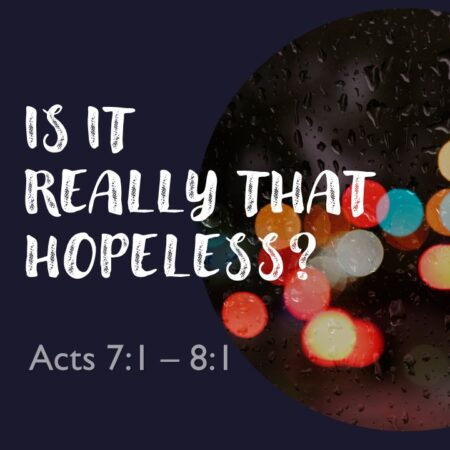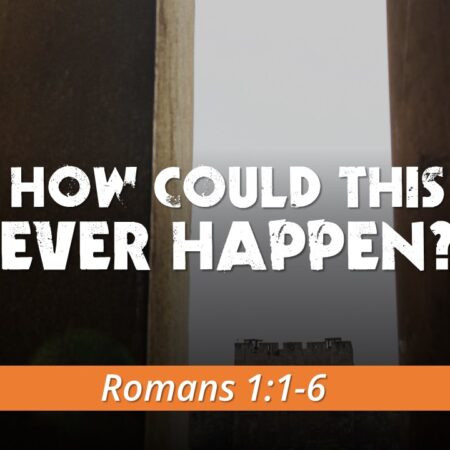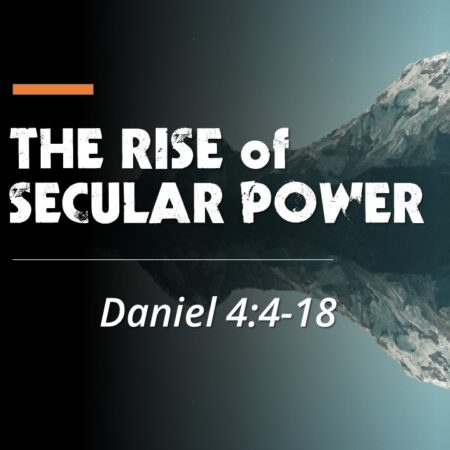1 Peter 1:3-21 (open your Bible and let’s read it)
You see that hope is more than mere wishful thinking. Hope is a vital necessity of life. Hope is a gift that God wants to give all of you. When your faith and hope is in God alone, dark pessimism, anxiety about the present and the future, depression and in some cases even suicidal thoughts, will evaporate.
Verse 13
Therefore, preparing your minds for action, and being sober-minded, set your hope fully on the GRACE that will be brought to you at the revelation of Jesus Christ.
There is Hope, LIVING HOPE, found in Christ Jesus alone.
Verse 24-25
All flesh is like grass and all its glory like the flower of grass.
The grass withers, and the flower falls,
BUT THE WORD OF THE LORD REMAINS FOREVER.
And this word is the good news that was preached to you.
George Orwell in his novel 1984 writes:
“We know that no one ever seizes power with the intention of relinquishing it. Power is not a means; it is an end. One does not establish a dictatorship in order to safeguard a revolution; one makes a revolution in order to establish a dictatorship…
The object of power is power.”
In 2006 Richard Dawkins wrote the famous book “The God Delusion”. The idea behind the book is TO EXPLAIN HOW THE IDEA OF GOD IS ONE GRAND DELUSION THAT HAS INFECTED HUMANKIND, AND THE CURE IS ATHEISM.
In chapter 2 we find this opening statement:
“The God of the Old Testament is arguably the most unpleasant character in all fiction; jealous and proud of it; a petty, unjust, unforgiving control-freak; a vindictive, bloodthirsty ethnic cleanser; a misogynistic, homophobic, racist, infanticidal, genocidal, filicidal, pestilential, megalomaniacal, sadomasochistic, capriciously malevolent bully. Those of us schooled from infancy in his ways can became desensitized to their horror.” Richard Dawkins “The God Delusion”
On Page 321:
“As a scientist, I am hostile to fundamentalist religion because it actively debauches the scientific enterprise. It teaches us not to change our minds, and not to want to know exciting things that are available to be known. IT SUBVERTS SCIENCE AND SAPS THE INTELLECT.”
David Berlinski, a secular Jew who holds a Ph.D. from Princeton University had to respond to Richard Dawkins book with a book on his own titled:
“The Devil’s Delusion; Atheism and its scientific Pretensions”
“If science stands opposed to religion, it is not because of anything contained in either the premises or the conclusions of the great scientific theories. They do not mention a word about God. They do not treat of any faith beyond the one that they themselves demand. They compel no ritual beyond the usual rituals of academic life, and these involve nothing more than the worship of what is widely worshipped. Confident assertions by scientists that in the privacy of their chambers they have demonstrated that God does not exist have nothing to do with science, and even less to do with God’s existence.”
“While science has nothing of value to say on the great and aching questions of life, death, love, and meaning, what the religious traditions of mankind HAVE said forms a coherent body of thought. The yearnings of the human soul are not in vain. There is a system of belief adequate to the complexity of experience. There is recompense for suffering. A principle beyond selfishness is at work in the cosmos. All will be well. I do not know whether any of this is true. I am certain that the scientific community does not know that it is false.
Occupied by their own concerns, a great many men and women have a dull, hurt, angry sense of being oppressed by the sciences. They are frustrated by endless scientific boasting. They suspect that as an institution, the scientific community holds them in contempt. They feel no little distaste for those speaking in its name. They are right to feel this way.” David Berlinski “The Devil’s Delusion”
A great many scientists are satisfied that at last someone has said out loud what so many of them have said among themselves:
“Scientific and religious belief are in conflict. They cannot be both right. Let us get rid of the one that is wrong.”
Quote from Peter Atkins, professor of physical chemistry at Oxford University and an ardent atheist.
In the course of an essay Atkins denounces not only theology but poetry and philosophy as well. He observes favorably of himself that scientists “are at the summit of knowledge, beacons of rationality, and intellectually honest”.
It goes without saying, Atkins adds, that “there is no reason to suppose that science cannot deal with every aspect of existence.” Science is after all, the apotheosis of the intellect and the consummation of the Renaissance.”
Dr. Anthony Fauci was interviewed by Michael Caputo on June 17, 2020
“ Well, one of the problems we face in the United States is that unfortunate, there is a combination of an anti-science bias that people are, for reasons that sometimes are, you know, inconceivable and not understandable, they just don’t believe science and they don’t believe authority. So, when they see someone up in the White House, which has an air of authority to it, who’s talking about science, that there are some people who just don’t believe that. And that’s unfortunate because YOU KNOW, SCIENCE IS TRUTH. AND IF YOU GO BY THE EVIDENCE AND BY THE DATA, YOU’RE SPEAKING THE TRUTH.” Dr. Anthony Fauci
There is no LIVING HOPE in science alone. You are still not convinced:
The first premise:
If God does not exist, then everything is permitted.
The second premise:
If science is true, then God does not exist.
The conclusion:
If science is true, then everything is permitted.
In 2007, a number of scientists gathered in a conference entitled:
“BEYOND BELIEF; SCIENCE, RELIGION, REASON, AND SURVIVAL”
The physicist Steven Weinberg delivered an address. He is one of the authors of the theory of electroweak unification, for which he was awarded a Nobel Price. Needless to say, he is a person of great stature among the scientific community. Here is what he said during this address:
“Religion is an insult to human dignity. With or without it you would have good people doing good things and evil people doing evil things. But for good people to do evil things, that takes religion.”
Ryan Holiday is the author of a book titled: “The Obstacle Is The Way”
“There is an old Zen story about a king whose people had grown soft and entitled. Dissatisfaction with this state of affairs, he hoped to teach them a lesson. His plan was simple; He would place a large boulder in the middle of the main road, completely blocking entry into the city. He would then hide nearby and observe their reactions.
How would they respond? Would they band together to remove it? Or would they get discouraged, quit, and return home?
With growing disappointment, the king watched as subject after subject came to this impediment and turned away. Or, at best, tried halfheartedly before giving up. Many openly complained or cursed the king or bemoaned the inconvenience, but none managed to do anything about it.
After several days, a lone peasant came along on his way into town. He did not turn away. Instead he strained and strained, trying to push it out of the way. Then an idea came to him; He scrambled into the nearby woods to find something he could use for leverage. Finally, he returned with a large branch he had crafted into a lever and deployed it to dislodge the massive rock from the road.
Beneath the rock were a purse of gold coins and a note from the king, which said:
“The Obstacle in the path becomes the path. Never forget, within every obstacle is an opportunity to improve our condition.”
As Susan Perlman in an article she wrote for “Jews for Jesus” publication said:
“One might ask, “What do we need pain for? Couldn’t we accomplish the same things with pleasure?”
The answer has to be that in pleasure we focus on ourselves and our feelings and our perceptions, which makes us to be mindful of ourselves and our will to be pleased; whereas pain helps us to focus outside of ourselves, to reach beside ourselves, to find out what’s there. Pleasure tends to make one self-centered, whereas pain tends to make a more noble person, other-centered and, hopefully God-centered.
A crisis becomes an occasion for declension or advance. A self-centered person in a crisis can become more self-centered and wallow in self-pity. God-centered or God-seeking persons can be propelled forward in their quest for meaning.
It is important to know that we are not helpless and we are not hopeless. We can choose to decide how we will deal with pain. We cannot choose whether or not we will have pain, but we can decide whether or not we will ALLOW PROBLEMS TO AFFECT US.
To live is to endure the pressures of life. But we can decide if we are going to let these things press us down or if we are going to let them lift us up.”
David Aikman wrote a book titled” GREAT SOULS” and in it he writes:
“I have always personally been inspired by the lives of great people. It is hard not to be energized by the stories of how individuals have risen above adversity or suffering or have maintained a purity in the face of great temptation. Our age, with its habit of instantly judging a man or woman’s life based on the fragmentary and proverbial sound bite, is often impatient with detail, nuances, depth.”
Chuck Swindoll writes about Joseph:
“Here is one on the list of God’s “greats”…….a life lived for His glory and, equally significant, though he was terribly mistreated, lived high above the all-too-common reactions of rage, resentment, and revenge. Here is one who deliberately chose to overlook unfair offenses, to overcome enormous obstacles, and model a virtue that is fast becoming lost in our hostile age – forgiveness.”
At the outset, Joseph’s life showed little promise – a simple shepherd, twelfth of thirteen children, a dreamer hated by his brothers. So how did he become a man so extraordinary that Moses spent almost fourteen chapters in the Book of Genesis telling his story? Where did Joseph get the qualities of integrity, leadership, and godliness in such measure that they took him from the pit of slavery to prime minister of Egypt?”
Through Joseph
• God explained dreams
• Revealed the future
• Saved Egypt and Israel from starvation
• Demonstrates the depth of love God has for all of us.
Paul is right:
For I am sure that neither death nor life, nor angels nor rulers, nor things present nor things to come, nor powers, not height not depth, nor anything else in all creation, will be able to separate us from the love of God in Christ Jesus our Lord.
Dr. Michael Heiser in his book: “The Unseen Realm” makes this statement:
“The seeds of that failure were sown in the events of the conquest. For whatever reasons – lack of faith or lack of effort, or both – Israel failed to drive out their enemies. They allowed vestiges of the targeted bloodlines to remain in the land in the Philistine cities. They chose to coexist (Judges 1:27-36). The visible Yahweh, the Angel, asks the rhetorical question, “Why would you do such a thing?” and he announces the consequences: “Now I say, I will not drive them out from before you; they will become as thorns for you, and their gods will be a trap for you” (Judges 2:2-3). The name of the place where he uttered these words was thereafter appropriately remembered as Bochim, a Hebrew word that means “weeping”.
John North wrote the foreword to Malcolm Muggeridge’s book titled: “The End of Christendom”
The book is based on Malcolm Muggeridge’s lecture series given in 1978 at the University of Waterloo, Ontario.
“Most of the great universities of the West were founded with the conviction that theology is the queen of the disciplines, and that the key to man’s wholeness is the pursuit of the truth of God through Jesus Christ. Apart from that truth, it was believed, all other expressions of truth are fragmentary and sterile. Now, in the latter part of the twentieth century, that tradition has almost disappeared. Where Jesus Christ and Christian doctrine are the subject of formal study, it is usually as a minor are of Comparative Religion or in a divinity school well segregated from the general student body. Religious enthusiasm among students is an embarrassment; belief in the authority of the Bible and the deity of Jesus Christ is treated as naivety to be enlightened rather than life to be nourished. Scholars in the arts, letters, and sciences who show signs of Christian devotion are likely to be shrugged off as simplistic and eccentric. Coincidentally, truth itself has become devalued, especially in the humanities and social sciences and increasingly in the pure sciences, its consequence and even existence of matter of doubt.
Universities seem to promote fragmentation, in part by undermining general studies in favor of specialized and practical studies, in part by ignoring the signs of decay in the spiritual, moral, and emotional health of the academic community.”
The historian Will Durant made this comment:
“There is not greater drama in human record then the sight of a few Christians, scorned and oppressed by a succession of emperors, bearing all trials with a fearless tenacity, multiplying quietly, but building order, while the enemy generated chaos. Fighting the sword with the Word of God, brutality with hope and at last defeating the strongest empire that history has ever known.
Caesar and Christ had met in the arena, and Christ had won.”
Chuck Swindoll in his commentary on these verses writes:
“During the interval of time between our Lord’s departure from the earth and His return, He is involved in two projects. One; to prepare a place for His children. Two; to prepare His children for a place. He is engaged right now in preparing heaven for His own. That’s what’s happening away from our sight. But on this earth, He is also engaged in preparing us for the life we will live in eternity with Him.”
“Lacking the courage to face something difficult or dangerous” Webster’s Dictionary
“If you describe someone or their behavior as FAINT HEARTED, you mean that they are not very confident and do not take strong action because they are afraid of failing.” COBUILD Advanced English Dictionary
James Madison, drafter of the Constitution, recorder of the Constitutional Convention, author of the Federalist Papers, and 4th president of the United States, was born on a plantation in Virginia.
“It is proper to take alarm at the first experiment on our liberties. We hold this prudent jealousy to be the first duty of citizens, and one of the noblest characteristics of the late Revolution. The freeman of America did not wait till usurped power had strengthened itself by exercise, and entangled the question in precedents. They saw all the consequences in the principle, and they avoided the consequences by DENYING THE PRINCIPLE.” James Madison
Reuters reported:
“As the United States begins reopening its economy, some state officials are weighing whether house arrest monitoring technology – including ankle bracelets or location-tracking apps – could be used to police quarantines imposed on coronavirus carriers. But while the tech has been used sporadically for U.S. quarantine enforcement over the past few weeks, large scale rollouts have so far been held back by a big legal question: Can officials impose electronic monitoring without an offence or a court order?”
More to the point, as the head of one tech company asked,
“Can you actually constitutionally monitor someone who’s innocent? It’s uncharted territory.”
John Whitehead in his book titled: “Battlefield America” with the subtitle: “The war on the American People”, writes:
“The war on terror, the war on drugs, the war on illegal immigration, asset forfeiture schemes, road safety schemes, school safety schemes, eminent domain; all of these programs started out as legitimate responses to pressing concerns and have since become weapons of compliance and control in the police state’s hands.
It does not even matter what the nature of the crisis might be – civil unrest, the nation emergencies, unforeseen economic collapse, loss of functioning political and legal order, purposeful domestic resistance or insurgency, pervasive public health emergencies, and catastrophic natural and human disasters – as long as it allows the government to justify all manner of government tyranny in the so-called name of national security. It’s hard to know who to trust anymore.”
Later in this chapter, John Whitehead goes on to point out the danger James Madison was warning us about 250 years ago:
“in this post 9-11 world, we have been indoctrinated into fearing and mistrusting one another instead of fearing and mistrusting the government. As a result, we’ve been forced to travel this road many, many times with lamentably predictable results each time; without fail, when asked to choose between safety and liberty, Americans historically tend to choose safety.
Failing to read the fine print on such devil’s bargains, “we the people” find ourselves repeatedly on the losing end as the government uses each crisis as a means of expanding its powers at taxpayers’ expense.”
What are the schemes of the devil right now where we are?
Adolf Hitler in “Mein Kampf”
Through clever and constant application of propaganda, people can be made to see paradise as hell, and the other way around to consider the most wretched sort of life.”
Bruce Levine in his book titled: “How TV Zombifies and Pacifies us and subverts Democracy” writes:
“Television is a “dream come true” for an authoritarian society. Those with the most money own most of what people see. Fear-based TV programming makes people more afraid and distrustful of one another, which is good for an authoritarian society depending on a “divide and conquer” strategy. Television isolates people so they are not joining together to govern themselves.
Viewing Television put some in a brain state that makes it difficult to think critically, and it quiets and subdues a population. And spending one’s free time isolated and watching TV interferes with the connection to one’s own humanity, and thus makes it easier to accept an authority’s version of society and life.”
Aldous Huxley in his masterpiece: “Brave New World”
“describes a vision of an unequal, technologically advanced future where humans are genetically bred, socially indoctrinated, and pharmaceutically anesthetized to passively uphold an authoritarian ruling order – all at the cost of our freedom, full humanity, and perhaps also our souls.”
Neil Postman in his book titled: “Amusing Ourselves to Death” explains what Huxley tried to communicate:
“What Huxley teaches is in the age of advanced technology, spiritual devastation is more likely to come from an enemy with a smiling face than from one whose countenance exudes suspicion and hate. In the Huxleyan prophecy, Big Brother does not watch us, by his choice. WE WATCH HIM, by ours. There is no need for wardens or gates or Ministries of Truth. When a population becomes distracted by trivia, when cultural life is redefined as a perpetual round of entertainments, when serious public conversations becomes a form of baby-talk, when, in short, a people become an audience and their public business a vaudeville act, then a nation finds itself at risk; a culture-death is a clear possibility.”
In 1958, Journalist Edward Murrow warned in a speech:
“We have currently a built-in allergy to unpleasant or disturbing information. Our mass media reflect this. But unless we get up off our fat surpluses and recognize that television in the main is being used to distract, delude, amuse, and insulate us, then television and those who finance it, those who look at it, and those who work at it, may see a totally different picture too late.”
Revelation 22:3-7
Then I saw a new heaven and a new earth, for the first heaven and the first earth have passed away, and the sea was no more. And I saw the holy city, new Jerusalem, coming down out of heaven from God, prepared as a bride adorned for her husband. And I heard a loud voice from the throne saying, “Behold, the dwelling place of God is with man. He will dwell with them, and they will be his people, and God himself will be with them as their God. He will wipe away every tear from their eyes, and death shall be no more, neither shall there be mourning, nor crying, nor pain anymore, for the former things have passed away.
And he who was seated on the throne said: “Behold, I am making all things new.” Also he said, “Write this down, for these words are trustworthy and true.” And he said to me; “It is done! I am the Alpha and the Omega, the beginning and the end. To the thirsty I will give from the spring of the water of life without payment. The one who conquers will have this heritage, and I will be his God and he will be my son.
Jordan Peterson wrote the bestseller “12 Rules for Life” – An Antidote to Chaos. It was published in 2018
Peterson’s book became an incredible bestseller because he was able to take ETERNAL TRUTHS AND APPLY THEM TO OUR MODERN PROBLEMS.
The foreword was written by Dr. Norman Doidge, MD, who authored the book titled ”THE BRAIN THAT CHANGES ITSELF”.
Let me read a short excerpt from this foreword that will lead us back to the Biblical text in a few minutes:
“Rules? More Rules? Really? Isn’t life complicated enough, restricting enough, without abstract rules that don’t take our unique, individual situations into account? And given that our brains are plastic, and all develop differently based on our life experiences, why even expect that a few rules might be helpful to us all?
People don’t clamour for rules, even in the Bible…..as when Moses comes down the mountain, after a long absence, bearing the tablets inscribed with ten commandments, and finds the children of Israel in revelry. They’d been Pharaoh’s slaves and subjects to these tyrannical regulations for four hundred years, and after that Moses subjected them to the harsh desert wilderness for another forty years, to purify them of their slavishness. Now, free at last, they are unbridled, and have lost all control as they dance wildly around an idol, a golden calf, displaying all manner of corporeal corruption.
“I’ve got some good news…….and I’ve got some bad news,” the lawgiver yells to them. “Which do you want first?”
“The good news!” the hedonists reply.
“I got Him from fifteen down to ten!”
“Hallelujah!” cries the unruly crowd. “And the bad?”
“Adultery is still in.”
So, rules there will be – but, please, not too many. We are ambivalent about rules, even when we know they are good for us. If we are spirited souls, if we have character, rules seem restrictive, an affront to our sense of agency and our pride in working out our own lives. Why should we be judged according to another’s rule?
And judged we are. After all, God didn’t give Moses “The Ten Suggestions,” he gave Commandments; and if I’m a free agent, my first reaction to a command might just be that nobody, not even God, tells me what to do, even if it’s good for me. But the story of the golden calf also reminds us that without rules we quickly become slaves to our passions – and there’s nothing freeing about that.
And the story suggests something more: unchaperoned, and left to our own untutored judgment, we are quickly to aim low and worship qualities that are beneath us – in this case, an artificial animal that brings out our own animal instincts in a completely unregulated way. The old Hebrew story makes it clear how the ancient felt about our prospects for civilized behavior in the absence of rules that seek to elevate our gaze and raise our standards.
One neat thing about the Bible story is that it doesn’t simply list its rules, as lawyers or legislators or administrators might; it embeds them in a dramatic tale that illustrates why we need them, thereby making them easier to understand.”
Francis Schaeffer in his book: “The God Who Is There”
“The Christian is to resist the spirit of the world. But when we say this, we must understand that the world spirit does not always take the same form. So the Christian must resist the spirit of the world IN THE FORM IT TAKES IN HIS OWN GENERATION. If he does not do this, he is not resisting the spirit of the world at all. This is especially so for our generation, as the forces at work against us are of such a total nature. It is our generation of Christians more than any other who need to heed these words attributed to Martin Luther:
“If I profess with the loudest voice and clearest exposition every portion of the truth of God except precisely that little point which the world and the devil are at that moment attacking, I am not confessing Christ, however boldly I may be professing Christ. Where the battle rages, there the loyalty of the soldier is proved, and to be steady on all the battlefields besides, is mere flight and disgrace if he flinches at that point.”
God highlighted 3 specific and important things for Joshua to do:
1. The Law was not to depart out of Joshua’s mouth. In other words, Joshua was to talk about the book of the Law.
2. He was to meditate on it day and night. In other words, Joshua had to reason out what Moses wrote down within it’s context.
3. Joshua was to practice the commands in his historic space-time situation.
About 40 years ago, Francis Schaeffer and C. Everett Koop, the former surgeon general of the Unites States, gave a lecture in which Francis Schaeffer made an astounding prediction. Ravi Zacharias attended this lecture and recalls it in his book titled WHY JESUS?
“At that talk, Schaeffer made a comment that caught me by surprise.
He said that the day was coming in the West when the name of Jesus
would not be recognized by the average young person; and if it were recognized, not a single historical fact about him would be known.
At that time I found this statement a bit hard to swallow and wondered
if he had said it just to be provocative. But a generation later, it is appearing to be quite true.”
Let me quote one more time Ravi Zacharias here:
“When you look back in the Old Testament, you see that in spite of all the instruction about worship, often repeated, and astounding loss nevertheless had occurred. All that the priests could control, they did. All that the ceremonies could control, they used to their advantage. And when a select or elect few control and sell salvation, the victim is always the common person. No religion is spared here.
One would think that this New Spirituality has brought about a new Eden and that its river flow peacefully and calmly. But it is not so…In fact, it has never been so. Few arenas lend themselves to abuse and loss as that of religion.”
Ravi Zacharias writes:
“It has been the beautiful teaching of the Word of God across time that has given this nation its ethos. It was this Word of God that put a song into the hearts of slaves during their darkest days. It was this Word of God that gave William Wilberforce in England the conviction and the courage to speak out against slavery and sustained him in the long struggle to see it abolished in the British Commonwealth. It was this Word of God that inspired Martin Luther King Jr. in his pursuit of civil liberty…And the same Word of God has transformed the life of many a prisoner, and of many others I could tell of, from some of the darkest parts of the world where the light of God’s Word has shone. Any nation that neglects teaching the sacredness of life and the family does so at its own peril. Any nation that sanctions the removal of God’s boundaries will destroy its own.”
Ravi Zacharias’ commentary on John 18 says:
“If there is any passage of Scripture that accurately describes our modern-day contempt for truth, our attachment to power, and our voluntary surrender to culture, it is this. It is not accidental that religious authorities, political appointees, and cultural symbols have come together to crucify him once again in our day. Barabbas was released…a cultural practice was fulfilled. “We have a law” … Political correctness was enjoyed. “he claims to be the Son of God…kill him” …all at the behest and with the blessing of religion. The irony is that he wanted to be owned by none of the three: culture, politics, or religion.”
In 1933 a group of 34 liberal humanists in the United States defined the philosophical and religious principles that seemed to them FUNDAMENTAL. They drafted humanist manifesto I which for its time was a radical document. It was concerned with expressing a general religious and philosophical outlook that REJECTED ORTHODOX AND DOGMATIC POSITIONS and provided meaning and direction, unity and purpose to HUMAN LIFE. It was committed to REASON, SCIENCE, AND DEMOCRACY.
HUMANIST MANIFESTO I
“The time has come for widespread recognition of the radical changes in religious beliefs throughout the modern world. The time is past for mere revision of traditional attitudes. Science and economic change have disrupted the old beliefs. Religions around the world labor with the task of coming to terms with new conditions created by a vastly increased knowledge and experience. In every field of human activity, the vital movement is now in the direction of a candid and explicit humanism. In order that religious humanism may be better understood we, the undersigned, desire to make certain affirmations which we believe the facts of our contemporary life demonstrate.”
“Today, man’s larger understanding of the universe, his scientific achievements, and his deeper appreciation of brotherhood, have created a situation which requires a new statement of the means and purposes of religion. Such a vital, fearless, and frank religion capable of furnishing adequate social goals and personal satisfaction my appear to many people as a complete break with the past. While this age does owe a vast debt to traditional religions, it is none the less obvious that any religion that can hope to be a synthesizing and dynamic force for today MUST BE SHAPED FOR THE NEEDS OF THIS AGE. To establish such a religion is a major necessity of the present. It is a responsibility which rests upon this generation. We therefore affirm the following:”
“The humanists are firmly convinced that existing acquisitive and profit-motivated society has shown itself to be inadequate and that a radical change in methods, controls, and motives must be instituted. A socialized and cooperative economic order must be established to the end that the equitable distribution of the means of life be possible. The goal of humanism is a free and universal society in which people voluntarily and intelligently cooperate for the common good. Humanists demand a shared life in a shared world.”
Paul Kurtz and Edwin H. Wilson wrote the preface to the manifesto II:
“As we approach the twenty first century an affirmative and hopeful vision is needed. Faith, commensurate with advancing knowledge, is also necessary. In the choice between despair and hope, humanists respond in this Humanist Manifesto II with a positive declaration for times of uncertainty.
As in 1933, humanists still believe that traditional theism, especially faith in the prayer-hearing God, assumed to love and care for persons, to hear and understand their prayers, and to be able to do something about them, is an UNPROVEN AND OUTMODED FAITH. Salvationism, based on mere affirmation, still appears as harmful, diverting people with false hopes of heaven hereafter; REASONABLE MINDS LOOK TO OTHER MEANS FOR SURVIVAL.”
Among the revised principles of Humanist Manifesto II, you find statements like this:
• “We find insufficient evidence for belief in the existence of the supernatural.”
• “Promises of immortal salvation or fear of eternal damnation are both illusory and harmful.
• “Modern science discredits such historic concepts as the ‘ghost in the machine’ and the ‘separable soul’.”
• Humane societies should evaluate economic systems not by rhetoric or ideology, but by whether or not they increase economic wellbeing for all individuals and groups, minimize poverty and hardship, increase the sum of human satisfaction, and enhance the quality of life.”
It even gets better: Principles 12-17 illustrate humanism’s missionary zeal. It is bent upon the creation of a global society.
“We deplore the division of humankind on nationalist grounds. We have reached a turning point in human history where the best option is to transcend the limits of national sovereignty and to move toward the building of a world community in which all sectors of the human family can participate.
The problems with economic growth and development can no longer be resolved by one nation alone; they are worldwide in scope. It is the moral obligation of the developed nations to provide – through an international authority that safeguards human rights – massive technical, agricultural, medical, and economic assistance, including birth control techniques, to the developing portions of the globe.
World poverty must cease. Hence extreme disproportions in wealth, income, and economic growth should be reduced on a worldwide basis.”
Ravi Zacharias
“The Camera had won the battle OF SEEING AND BELIEVING. The world, and America in particular, was foundationally transformed. The zeal of young, combined with the material means that their parents had fought to give them and the invasiveness of the medium of television, made for a powerful overthrow of the reigning worldview.
The battle was carried into the universities, whose own academic experts were flaying America, and the intelligentsia hit hard at political demagoguery, as they called it.
…And all this was reflected in the arts as rock stars changed the mathematical rules of music and discord became entertainment. Noise became deafened to reason.
…At the time, most people failed to understand the power of the media to change their views and reshape their thinking. Instead of viewing the world THROUGH the medium of television, they allowed the medium TO DEFINE THE WORLD FOR THEM.”
In the same book “WHY JESUS” Ravi goes on to explain:
“There is a war raging. It is the battle for thought and belief through a weapon of mass deconstruction. In that battle, it is not firepower we need to fear as much as it is electronic power. From the conscious to the subconscious we are in its grip. From wars in different lands to battles for moral acceptability, the television set has won the day. I stress this because I believe that almost none of the NEW SPIRITUALITIES would be so pervasive if it were not for the genius and built-in distortion of television. It reinforces what WE WANT TO BELIEVE, and if what WE WANT TO BELIEVE is WHAT WE ARE TOLD TO BELIEVE THROUGH THE MEDIUM, no amount of logic or argument can shake that conviction. Whichever way you want to look at it, television – and now viral media – is the SHAPER OF EVERYTHING WE THINK AND BELIEVE.”
The word translated “healthy” is “HAPLOUS” which means “motivated by singleness of purpose so as to be open and above board, single, without guile, sincere, straightforward.”
Tom Landry, the legendary coach of the Dallas Cowboys and a committed follower of Jesus, said: “The job of a coach is to make men do what they don’t want to do, in order to be what they’ve always wanted to be.”
Blaise Pascal, the French mathematician and philosopher, wrote:
“There are only three kinds of persons; those who serve God having found him; others who are occupied in seeking him, not having found him; while the remainder live without seeking him and without having found him. The first are reasonable and happy; the last are foolish and unhappy; those between are unhappy and reasonable.”
Robert Maginnis in his book “Collision Course – The fight to reclaim our Moral Compass before it’s too Late” writes:
“Even though the pain of the cultural revolution is especially acute at present, the truth is it started decades ago when the so-called progressives began planning the gradual destruction of America. Their achievements were gradual such as removing God from the public square, making our public schools into leftist brainwashing machines that teach children to hate God, country and their parents.”
HARVARD UNIVERSITY
“Let every student be plainly instructed and consider well that the main end of his life and studies is to know God and Jesus, which is eternal life and therefore to lay Christ in the bottom as the only foundation of all sound knowledge and learning.
Everyone shall so exercise himself in reading the Scriptures twice a day that he shall be ready to give such an account of his proficiency therein.” Harvard student directives, 1643
YALE UNIVERSITY
“In all, have an eye to the great end of all your studies, which is to obtain the clearest conception of Divine things and to lead you to a saving knowledge of God in His Son, Jesus Christ.
Thomas Clapp, Yale President 1740
Yale’s Requirements:
“All scholars are to live a religious and blameless life according to the rules of God’s word, diligently reading the Holy Scriptures, and constantly attending all the duties of religion.
Yale student regulations, 1745
PRINCETON UNIVERSITY
“Every student shall attend worship in the college hall morning and evening and shall attend public service on the Sabbath. There shall be assigned to each class certain exercises for the religious instruction. And no student belonging to any class shall neglect them.
He is the best friend to American liberty who is the most sincere and active in promoting true and undefiled religion and who sets himself with the greatest firmness to bear down on profanity and immorality of every kind. Whosoever is an avowed enemy of God, I hesitate not to call him an enemy of this country.”
John Witherspoon, President of Princeton University
What one generation tolerates; the next generation will embrace.” John Wesley
The following letter from college student Marcy Musgrave in the editorial section of the Dallas Morning News on Sunday, May 2, 1999.
“Generation NEXT has some Questions. I am a member of the upcoming generation – the one after Generation X that has yet to be given a name. So far, it appears that most people are rallying behind the idea of calling us Generation Next. I believe I know why. The older generations are hoping we will mindlessly assume our place as the “next” in line. That way, they won’t have to explain why my generation has had to experience so much pain and heartache. “What heartache?” you say. “Don’t you know you have grown up in a time of great prosperity?” Yea, we know that.
Believe me, it has been drilled into our heads since birth. Unfortunately, the pain and hurt I speak of can’t be reconciled with money. You have tried for years to buy us happiness, but it is only temporary. Money isn’t the answer, and it is time for people to begin admitting their guilt for failing my generation. I will admit that I wasn’t planning to write this. I was going to tuck it away in some corner of my mind and fall victim to your whole “next” mentality.
But after the massacre in Littleton, CO, I realize that as a member of this generation that kills without remorse, I had a duty to challenge all of my elders to explain why they have allowed things to become so bad. Let me tell you this; These questions don’t represent only me but a whole generation that is struggling to grow up and make sense of this world. We all have questions; we all want explanations. People may label us Generation NEXT, but we are more appropriately Generation “WHY?”
“Why did most of you lie when you made the vow of ‘til death do us part’?
Why do you fool yourselves into believing that divorce really is better for the kids in the long run? Why do so many of you divorced parents spend more time with your new boyfriend or girlfriend than with your own children? Why did you ever fall victim to the notion that kids are just as well off being raised by a complete stranger at a daycare center than by their own mother or father? Why do you look down on parents who decide to quit work and stay home to raise their children? Why does the television do the most talking at family meals? Why is work more important than your own family? Why is money regarded as more important than relationships?
Why is ‘quality time’ generally no longer than a five-to-10 minute conversation each day? Why do you try to make up for the lack of time you spend with us by giving us more and more material objects that we really don’t need? Why does your work (in the form of a cell Phone, laptop computer, etc.), always come with us on vacations? Why have you neglected to teach us values and morals? Why haven’t you lived moral lives that we could model our own after? Why isn’t religion one of the most important words in our household? Why do you play God when it comes to abortion? Why don’t you have enough faith in us to teach us abstinence rather than safe sex? Why do you allow us to watch violent movies but expect us to maintain some type of childlike innocence? Why do you allow us to spend unlimited amounts of time on the Internet, but still are shocked about our knowledge of how to build bombs? Why are you so afraid to tell us ‘NO’ sometimes? Why is it so hard for you to realize that school shootings, and other violent juvenile behavior, result from a lack of your attention more than anything else? Call us GENERATION NEXT if you want to, but I think you will be surprised at how we will fail to fit into your neat little category. These questions should, and will, be asked of the generations that have failed us.” Marcy Musgrave, a junior at Texas A&M University
“Give me four years to teach the children and the seed I have sown will never be uprooted.” Vladimir Lenin
Ravi Zacharias in his book “Jesus among Secular God’s” (2017) makes this observation regarding Europe:
“I will go so far as to say that the West is on the verge of collapse at the hands of its own secular intellectuals. It is only a matter of time. The Christian faith brings with it convictions by which to stand and build a moral framework. The secular thinker, with his implicitly amoral assumptions, imagines that knowledge without a moral base has enough sustaining power. It simply doesn’t.
Watch Europe cower under the heel of Islamists who have not forgotten that they were stopped from overtaking Europe and beaten back by Charles Martel thirteen centuries ago. Now, with patience and the clever control of demographics and a gullible media, they stand by, ready to one day take over the structures and edifices built by a different ethic and a different belief system. It is only a matter of time, and they are in no hurry. Thirteen centuries ago, Europe was able to stop the theocratic Islamic tidal wave BECAUSE IT HAD A FAITH TO DEFEND. The value-less culture of today will not be able to withstand the attack.”
The same year (2017) Douglas Murray published the book titled: “The Strange Death of Europe”
He starts the Introduction with these words: “Europe is committing suicide. Or at least its leaders have decided to commit suicide. Whether the European people choose to go along with this is, naturally, another matter.”
The Latin for radical is ‘RADIX’ which means “to cut to the root”
Dr. Martin Luther King Jr. warned: “If the church does not recapture its prophetic zeal, it will become an irrelevant social club without moral or spiritual authority.”










